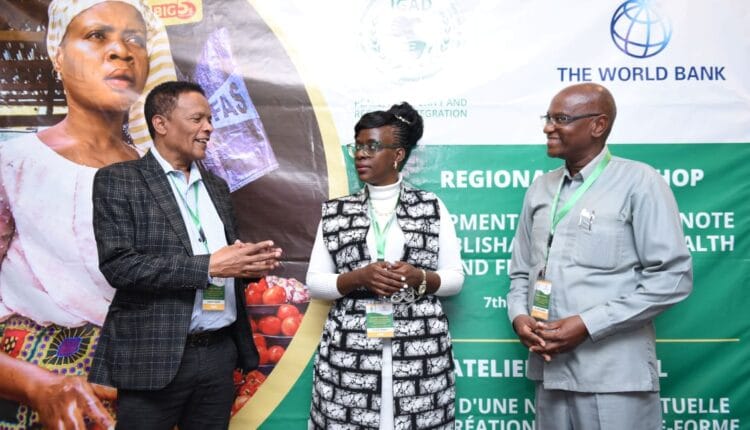IGAD States and Partners Meet to Draft Roadmap Aligned with 2024 Soil Summit

By Shadrack Nyakoe
The Intergovernmental Authority on Development (IGAD) through its Program of Food Systems Resilience for Eastern and Southern Africa (FSRP) is convening with IGAD Member States and Technical Partners at a regional write-shop as a follow up of the Africa Fertilizer and Soil Health Summit (AFSHS) of May 2024 to discuss the outcome and follow up actions/roadmap for implementing the Summit’s Declaration with the ultimate goal of enhancing food security, increasing agricultural productivity and supporting the overall economic development of African nations.
The Outcome of the AFSHS of 2024 was the Nairobi Declaration which endorsed the Fertilizer and Soil Health Action Plan and the Soil Initiative for Africa Framework.
It is on the heels of the Summit, that continental action plans highlighted Africa’s low fertilizer consumption and minimal application rates insufficient to meet agricultural production targets or replenish soil nutrients.
Also highlighted was that most IGAD Member States failed to achieve the commitment of 50 kilograms of fertilizers per hectare in the last CAADP-MALABO 4th BR reporting period thus the need to emphasize fertilizer use efficiency, nutrient stewardship, and the integration of organic fertilizers, bio-fertilizers, and soil amendments like liming to improve soil health and agricultural productivity.
Soil health remains fundamental in improving productivity and food security for the region thus the need for the formulation of action plans, policy recommendations and commitments from governments and various stakeholders to invest in and support sustainable agricultural practices in order to; increase the efficiency of fertilizers; promote sustainable methods that can strengthen soil health and guarantee food security and economic growth as well as address challenges and opportunities related to soil health and fertilizer use in African countries.
IGAD is implementing a seven-year Food Systems Resilience Program that is built on four pillars of; re-building resilient agricultural production capacity; supporting the sustainable development of natural resources for resilient agricultural landscapes; and getting to the market and promoting a greater focus on food systems resilience in national and regional policymaking.
The Program is with a Development Objective (PDO) of increasing resilience of food systems and preparedness for food insecurity in participating countries with the support from the World Bank.
On behalf of IGAD’s Director of Agriculture and Environment, Dr Eshete Dejen; the Program Manager for Sustainable Environment Protection and Coordinator of Blue Economy emphasized that healthy soils are important to maintaining food security, resilient agriculture, and sustainable agriculture in Africa by promoting holistic soil health management through soil and fertilizer interventions that will enhance improved crop production, increased food security, increased exports, more employment opportunities and overall economic growth.
“More than 20% of Africa’s land is affected by soil degradation, which has a substantial impact on the environment, human livelihoods, and food production thus the need to increase agricultural output and protect the future of Africa’s food systems, it is imperative that soil degradation be reversed through the reduce of over-reliance of inorganic fertilizers as well as reduce cost of fertilizers. This can only be possible through joint stakeholder approaches with public and private sectors for a successful Soil Hub with Member States committing and providing additional financing of the agriculture sector from their public budgets,” Eshete added.
The meeting was officiated by David Kamau, the Director at Environment & Natural Resource Systems at Kenya Agricultural and Livestock Research Organization (KALRO) reiterated that to increase fertilizer use, agricultural production and agricultural productivity and reminded the Member States that they committed to ensuring the implementation and domestication of the Continental Action Plan in order to restore the health of Africa’s soils by endorsing the Nairobi Declaration on ‘Fertilizer and Soil Health’ and the ‘Soil Initiative for Africa’ Framework using effective and efficient measures to ensure competitive production and sustained profitability or to facilitate uptake of technologies.
Read also:- 27 million in IGAD region faced acute food insecurity in 2018 – report
Kamau called upon the IGAD Member States to have a collaborative approach towards increase in domestic production and distribution of certified quality organic and inorganic fertilizers; make available targeted agronomic recommendations for specific crops, soils, and climatic conditions to at least 70% of smallholder farmers on the continent; reverse land degradation and restore soil health on at least 30% of degraded soil; fully operationalize the Africa Fertilizer Financing Mechanism to improve the production, procurement, and distribution of organic and inorganic fertilizers, and soil health interventions; formulate and implement policies and regulations to create a conducive environment for fertilizer and soil health interventions; develop and promote systemic national capacity building for locally relevant fertilizer and soil health management practices and technologies and ensure that at least 70% of smallholder farmers have access to quality extension and advisory services on fertilizer and soil health from public and private extension systems by 2034.
During this meeting, the IGAD Member States will present their country statuses of soil fertility management as well as highlight institutional arrangements, challenges and gaps.
Also to be discussed at the Write-Shop are the Declaration’s implications in the IGAD region and to share knowledge on exemplary techniques for soil hub creation from experiences of other regions in Africa and to create a proposal and strategy for Soil Hub formation borrowing lessons of Hub designs from West Africa and Southern Africa.
The regional consultative write shop is being attended by participants from IGAD Member States, IGAD Agriculture and Environment Division, Accelerating Impacts of GIAR Climate Research for Africa (AICCRA), Consortium of International Agricultural Research Centers (CGIAR – ICRAF) Center for International Forestry Research and World Agroforestry (CIFOR-ICRAF), Africa Fertilizer Financing Mechanism (AFFM) of African Development Bank, African Fertilizer and Agribusiness Partnership (AFAP), International Fertilizer Development Center (IFDC), Alliance for Green Revolution Africa (AGRA), FAO, SADC – CCARDESA, Forum for Agricultural Research in Africa (FARA) to mention but a few.


